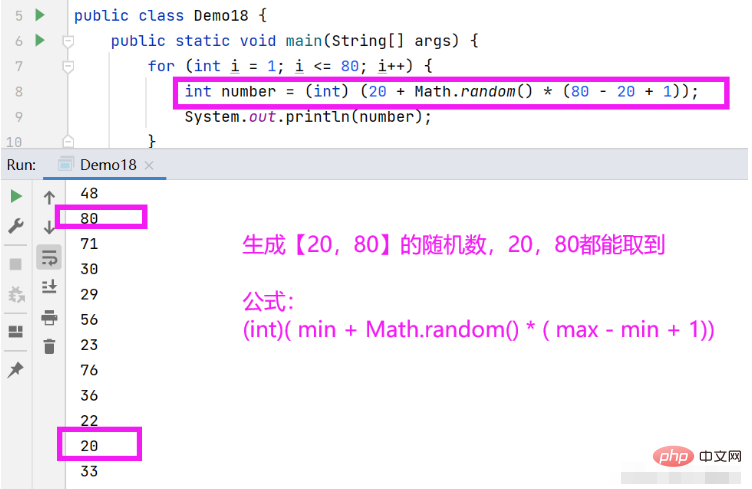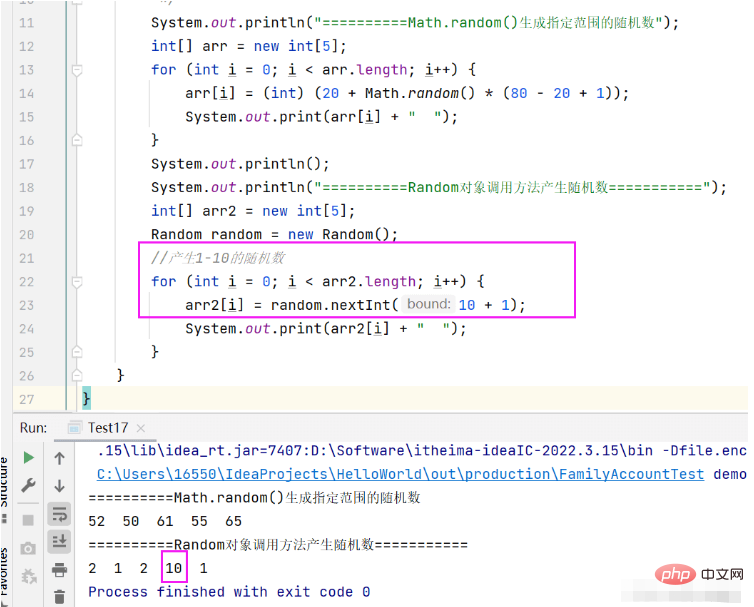How to generate a random integer within a specified range in Java
1. Use Math.random() to generate a double type [0.0, 1.0) random number (the actual value is [0.0, 0.9999999])
Suppose we want to generate a [ 20, 80] random numbers, 20 can be obtained, and 80 can also be obtained.
Generate a random integer within the range of [min, max]
Formula:
(int)(min Math.random() * (max - min 1))
Test Case: Generate a random integer of [20, 80]
public static void main(String[] args) {
for (int i = 1; i <= 80; i++) {
int number = (int) (20 + Math.random() * (80 - 20 + 1));
System.out.println(number);
}
}You can print the test results several times.

2. Create a Random class object and call the nextInt() method to generate a random number
Requirements: Generate random numbers from 0 to 10, including 0 and 10
Random random = new Random(); int num = random.nextInt(10); //这样写的话,生成[ 0,9]的随机整数数。
If we want to include 0 and 10, we should write it like this
int num = random.nextInt(10+1);
That is to say, the maximum range number in the brackets is actually unavailable, so we have to put 1 in the brackets .
nextInt() generates random integer regular formula:
Requirement: Generate random integers within the range of [min, max], including min and max
Random random = new Random(); int num = min + random.nextInt( max - min + 1);
Refer to the requirement to generate [0, 10 】The random integer application formula:
//生成【0,10】的随机整数 Random random = new Random(); int num = 0 + random.nextInt( 10 - 0 + 1); // int num = random.nextInt(11);
Test case code:
public static void main(String[] args){
System.out.println("==========Random对象调用方法产生随机数===========");
int[] arr2 = new int[5];
Random random = new Random();
//产生【1-10】的随机数
for (int i = 0; i < arr2.length; i++) {
arr2[i] = random.nextInt(10 + 1);
System.out.print(arr2[i] + " ");
}
}Randomly print the test data (the results are random, you can run it several times to observe the results)

Guess the number game
The system randomly generates a random number [1, 100]. The user inputs a number from the console. The two are compared. If they are not equal, then Prompts the user whether the number he entered is larger or smaller than the random number generated by the system.
import java.util.Scanner;
public class Demo18 {
public static void main(String[] args) {
Scanner sc = new Scanner(System.in);
int randomNumber = (int) (1 + Math.random() * (100 - 1 + 1));
int userNumber;
while (true) {
System.out.println("请输入您猜测的数字[1,100]:");
userNumber = sc.nextInt();
if (userNumber == randomNumber) {
System.out.println("恭喜您猜对了");
System.out.println("系统生成的随机数:" + randomNumber);
break;
} else if (userNumber > randomNumber) {
System.out.println("您猜的数字偏大");
} else {
System.out.println("您猜的数字偏小");
}
}
System.out.println("游戏结束!");
}
}The above is the detailed content of How to generate a random integer within a specified range in Java. For more information, please follow other related articles on the PHP Chinese website!

Hot AI Tools

Undresser.AI Undress
AI-powered app for creating realistic nude photos

AI Clothes Remover
Online AI tool for removing clothes from photos.

Undress AI Tool
Undress images for free

Clothoff.io
AI clothes remover

AI Hentai Generator
Generate AI Hentai for free.

Hot Article

Hot Tools

Notepad++7.3.1
Easy-to-use and free code editor

SublimeText3 Chinese version
Chinese version, very easy to use

Zend Studio 13.0.1
Powerful PHP integrated development environment

Dreamweaver CS6
Visual web development tools

SublimeText3 Mac version
God-level code editing software (SublimeText3)

Hot Topics
 Square Root in Java
Aug 30, 2024 pm 04:26 PM
Square Root in Java
Aug 30, 2024 pm 04:26 PM
Guide to Square Root in Java. Here we discuss how Square Root works in Java with example and its code implementation respectively.
 Perfect Number in Java
Aug 30, 2024 pm 04:28 PM
Perfect Number in Java
Aug 30, 2024 pm 04:28 PM
Guide to Perfect Number in Java. Here we discuss the Definition, How to check Perfect number in Java?, examples with code implementation.
 Random Number Generator in Java
Aug 30, 2024 pm 04:27 PM
Random Number Generator in Java
Aug 30, 2024 pm 04:27 PM
Guide to Random Number Generator in Java. Here we discuss Functions in Java with examples and two different Generators with ther examples.
 Weka in Java
Aug 30, 2024 pm 04:28 PM
Weka in Java
Aug 30, 2024 pm 04:28 PM
Guide to Weka in Java. Here we discuss the Introduction, how to use weka java, the type of platform, and advantages with examples.
 Armstrong Number in Java
Aug 30, 2024 pm 04:26 PM
Armstrong Number in Java
Aug 30, 2024 pm 04:26 PM
Guide to the Armstrong Number in Java. Here we discuss an introduction to Armstrong's number in java along with some of the code.
 Smith Number in Java
Aug 30, 2024 pm 04:28 PM
Smith Number in Java
Aug 30, 2024 pm 04:28 PM
Guide to Smith Number in Java. Here we discuss the Definition, How to check smith number in Java? example with code implementation.
 Java Spring Interview Questions
Aug 30, 2024 pm 04:29 PM
Java Spring Interview Questions
Aug 30, 2024 pm 04:29 PM
In this article, we have kept the most asked Java Spring Interview Questions with their detailed answers. So that you can crack the interview.
 Break or return from Java 8 stream forEach?
Feb 07, 2025 pm 12:09 PM
Break or return from Java 8 stream forEach?
Feb 07, 2025 pm 12:09 PM
Java 8 introduces the Stream API, providing a powerful and expressive way to process data collections. However, a common question when using Stream is: How to break or return from a forEach operation? Traditional loops allow for early interruption or return, but Stream's forEach method does not directly support this method. This article will explain the reasons and explore alternative methods for implementing premature termination in Stream processing systems. Further reading: Java Stream API improvements Understand Stream forEach The forEach method is a terminal operation that performs one operation on each element in the Stream. Its design intention is






